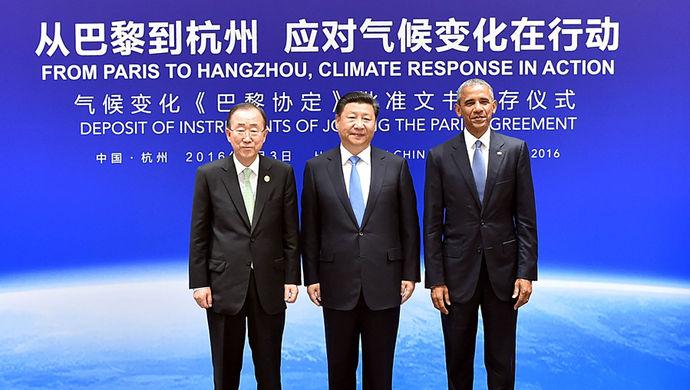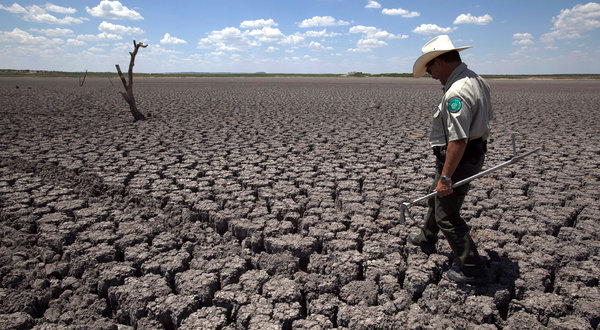China and the US finally inked their commitment to global climate governance on the eve of the theatrical G20 Summit. The two biggest emitters of greenhouse gases have both formally joined the Paris global climate agreement, which was approved last December. By taking the lead in this regard, Chinese President Xi Jinping said both countries have showed their "ambition and determination to jointly tackle a global challenge."

2016年9月3日,国家主席习近平同美国总统奥巴马(右)、联合国秘书长潘基文(左)出席《巴黎协定》批准文书交存仪式。
Climate change is one of the priorities on the G20 agenda, and this year marks a crucial period time to nail the world's first comprehensive climate agreement.
At the UN Climate Change Conference in Paris last November, joint efforts between China and the US led to the approval of the Paris deal, which has become the roadmap for the world to deal with climate change after 2020. The deal will only come into force legally after it is ratified by 55 countries, whose carbon emissions account for 55 percent of the global total.
Prompted by China and the US, this year's G20 will issue a communique about climate change, urging all participants to implement the Paris agreement. As a major platform to discuss international economic issues, the G20 is playing an increasingly significant role in climate change.

China has dramatically changed its approach to climate change in recent years. In the past, China was reluctant to reduce carbon emissions for fear of shutting down factories, which would raise its export prices and spoil its impressive GDP growth rate.
However, China has realized that optimizing the structure of energy consumption and improving low-carbon development is essential to its economic transformation. New measures to deal with climate change can not only smooth pressures from the international community, but also ensure China's sustainable growth.
China has adopted a progressive strategy to reduce carbon emissions, and a new climate change law is waiting to be promulgated. In 2014, China's consumption and emission rate of carbon dioxide have reduced by 29.9 percent and 33.8 percent respectively compared to 2005.
China has become the most avid practitioner of new energy and renewable resources. China's non-fossil energy accounts for 11.2 percent of the total energy consumed in 2014, 4.4 percentage points higher than 2005. China is committed to reducing the emission of carbon dioxide by 60 to 65 percent by 2030, and in 2017, China will initiate a nationwide market for carbon emission trade.
China is displaying leadership in climate governance. Beijing believes that the key to dealing with climate change is to narrow the area of difference between developing and developed countries.
As the biggest developing country, China insists that every country must take its due responsibility, and the developed countries should offer more solid support for the developing countries. China set an example by initiating the China South-South Climate Cooperation Fund and investing 20 billion yuan ($2.99 billion) into it.

Beijing and Washington's cooperation in climate change has impressed the world, and also becomes the biggest highlight in their bilateral relationship. In 2013, under the framework of strategic and economic dialogue, China and the US launched a special working group for climate change.
In 2014 and 2015, both countries issued joint statements about climate change, making a commitment to the rest of the world about their determination to reduce carbon emissions. Together China and the US are responsible for 40 percent of global carbon emissions, so their joint action means a lot to the global climate governance.
In August, 2015, the UN released a 2030 agenda for Sustainable Development Goals (SDG) in place of the Millennium Development Goals issued in 2000. Climate change has taken a prominent position on the agenda. The Secretary-General of the United Nations Ban Ki-moon said we are "the last [generation] that can end climate change."
As the G20 president, China has included the SDG into the agenda of the summit. China hopes the world can keep the climate change in perspective by being more inclusive and sustainable.
Climate change, China believes, is not a burden, but might be an opportunity to create new economic spin-offs.
(本文作者系察哈尔学会研究员,原载于《环球时报》英文版。)